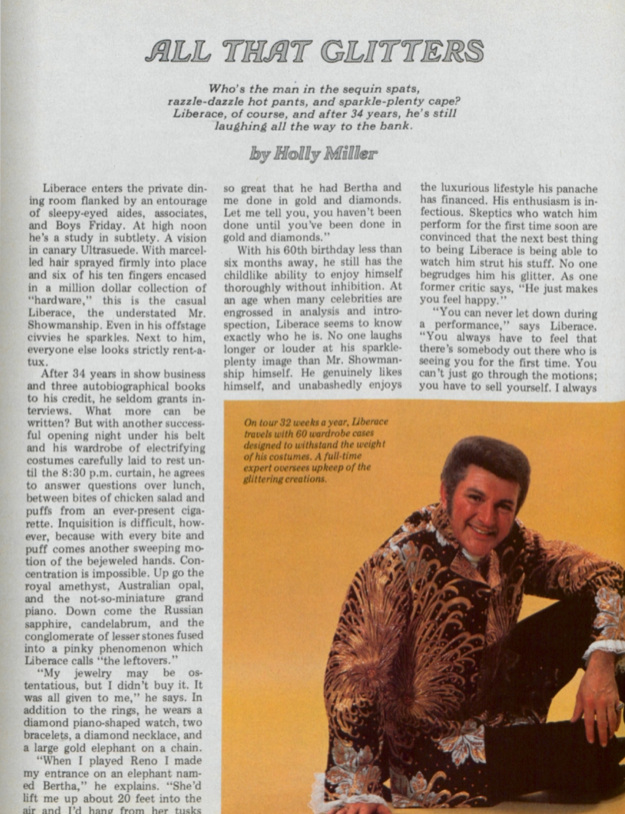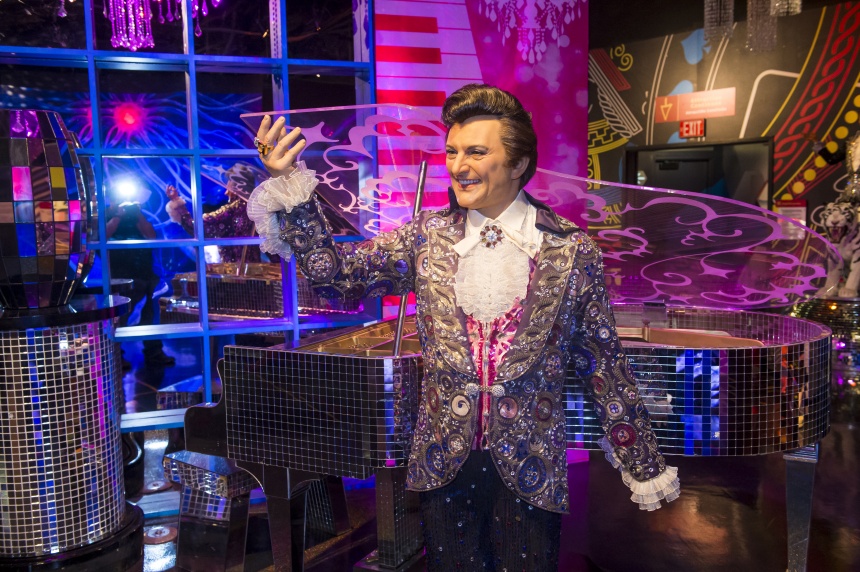Wladziu Valentino Liberace had no shortage of costly possessions: sparkling Rolls Royces, Belle Époque-era pianos, marble-columned bathrooms. But when Oprah Winfrey interviewed the grand pianist in 1986, he spoke candidly: “The most important and valuable thing in one’s life is your health, and if you have that you’re a rich person.” Six weeks later, Liberace passed away. Today, he would be 100 years old.
As a performer, Liberace made a living by pushing the boundaries of his own extravagance. Crowd-pleasing renditions of classical, ragtime, and pop favorites filled his concerts, but his persona — aloof, campy, and self-deprecating — shined through his rhinestone capes and stole the show. In the 1950s, he became one of the most popular personalities on television in his syndicated The Liberace Show wearing tuxedoes and speaking amiably into the camera. By the ’70s, he was donning 200-pound capes made of chinchilla and spouting lines like, “Sometimes people will ask me how it feels to be famous. I usually tell them it beats obscurity all to hell!”
This magazine covered “Mr. Showmanship” in 1978 in a profile called “All That Glitters.” Liberace’s curious choice to play classics alongside pop and nostalgia tunes all started one night at a concert in his home state of Wisconsin: “At the end of a performance in LaCrosse, he asked his audience for requests. Someone yelled out for the ‘Three Little Fishies.’ With a dignified flip of his coattails, Liberace sat down and rendered a string of ‘Little Fishies’ done in the style of the great masters.” His ability to weave high and low brow performance proved to be a hit, especially in the Midwest. Over the years, Liberace turned up the flamboyance, his diamond- and pearl-studded costumes reflecting his real-life fixation with luxury.
“The Franz Liszt of Las Vegas” insisted he “laughed all the way to the bank!” when he wasn’t received well — which was often. Critics, journalists, and comedians got creative poking at the pianist and his unconventional displays of music and manhood. Writing in The New Republic in 1984, Edward Rothstein attempted to analyze Liberace’s popularity: “The music, too, is just an image: no ‘real’ Beethoven or Liszt or Chopin is played. What is heard instead is a stylized reference to this music … Liberace’s ‘Moonlight Sonata’ is meant to invoke the great and distant Beethoven, but in a way that defers to the sentimental meanings that have accumulated around classical music for the popular listener.”
Claims that Liberace wasn’t “the marrying type” abounded, both in late night jokes and newspaper stories. What seemed obvious to so many — that he was gay — was vehemently denied by the performer. His cute, eccentric persona completed a fantasy for his dedicated fanbase of maternal Midwesterners, and he could scarcely afford to lose that with a big scandal.
When Liberace appeared on Oprah’s show, it was his last interview. It was Christmastime, his favorite season, when he could lavish gifts on his friends and throw exorbitant parties. Unbeknownst to her audience or any viewers, he had been infected with the HIV virus. She asked him what he would like people to know about him, and he said, “People don’t know me as a private person. They don’t know what makes me tick when I’m not onstage, and I love being a human being.”

Featured Image: Shutterstock
Become a Saturday Evening Post member and enjoy unlimited access. Subscribe now




Comments
Your article on Liberace was very Good-and most of all balanced. Liberace was a Great performer, regardless of hs alleged homosexuality. He was Classical, Jazz, Pop and contemporary. Most off all, he pulled all this off in the most lavish, decadent, exorbitant and ‘Over the Top’ style imaginable f/ that period of ‘Americana’. I regret when I was in Las Vegas several yrs. ago, I was unable to visit/ attend his Liberace Museum. More so that he were still here. He’d give Pres. Trump a ‘Run for his money’ as far as stealing the ‘Limelight’ goes.